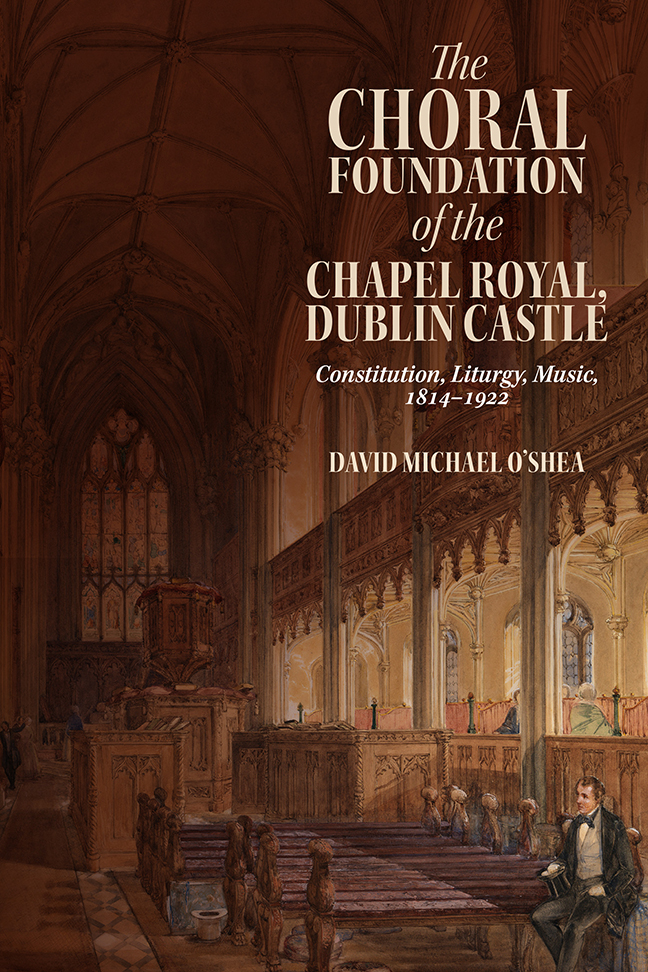Book contents
- Frontmatter
- Contents
- Illustrations
- Foreword
- Preface
- Acknowledgements
- A Note on Terminology
- Abbreviations
- Introduction
- 1 Precedents, Polity and Politics
- 2 Clergy
- 3 Churchmanship, Furnishings and Functions
- 4 The Musical Foundation
- 5 The Chapel Royal Music Collection
- 6 Singing the Liturgy
- 7 Organs
- 8 Boy Choristers
- 9 Gentleman Singers
- 10 Organists and Composers
- 11 The Chapel Royal's Legacy
- Conclusion
- Appendix A Lords Lieutenant, 1801–1922
- Appendix B Clergy of the Chapel Royal
- Appendix C Extant Chapel Royal Music Volumes (RCB MS 1113)
- Appendix D Boy Choristers of the Chapel Royal
- Appendix E Gentlemen Singers of the Chapel Royal
- Appendix F Organists of the Chapel Royal
- Appendix G Fragment of a Juvenile Chant by C. V. Stanford
- Bibliography
- Index
- Irish Musical Studies Previous volumes
6 - Singing the Liturgy
Published online by Cambridge University Press: 10 January 2024
- Frontmatter
- Contents
- Illustrations
- Foreword
- Preface
- Acknowledgements
- A Note on Terminology
- Abbreviations
- Introduction
- 1 Precedents, Polity and Politics
- 2 Clergy
- 3 Churchmanship, Furnishings and Functions
- 4 The Musical Foundation
- 5 The Chapel Royal Music Collection
- 6 Singing the Liturgy
- 7 Organs
- 8 Boy Choristers
- 9 Gentleman Singers
- 10 Organists and Composers
- 11 The Chapel Royal's Legacy
- Conclusion
- Appendix A Lords Lieutenant, 1801–1922
- Appendix B Clergy of the Chapel Royal
- Appendix C Extant Chapel Royal Music Volumes (RCB MS 1113)
- Appendix D Boy Choristers of the Chapel Royal
- Appendix E Gentlemen Singers of the Chapel Royal
- Appendix F Organists of the Chapel Royal
- Appendix G Fragment of a Juvenile Chant by C. V. Stanford
- Bibliography
- Index
- Irish Musical Studies Previous volumes
Summary
The choral service, and sources for music and liturgy
The promulgators of the first Book of Common Prayer, issued in 1549, hoped that the book would bring uniformity in liturgical practice to the entire English church:
And where heretofore, there hath been great diversitie in saying and synging in churches within this realme […] Now from hencefurth, all the whole realme shall have but one use.
Although liturgical texts and orders of service were made uniform by this book, this ‘one use’ developed different flavours in different places, especially in the distinction between cathedral and parochial liturgical modes. Interpretations of the rubrics of the Prayer Book varied, and in some places rubrics were ignored for reasons of convenience. John Jebb's treatise The Choral Service amply demonstrated such omissions and the consequently diverse approaches to liturgy that existed in different choral foundations.
Aside from the omission of particular aspects of services, and the disregarding of rubrical directions, the most significant reason for liturgical diversity was the use (or disuse) of music in various parts of the services. Jebb considered the following to be the ‘essential parts’ of the choral service (i.e., the liturgy common to choral foundations):
1. The Chanting by the Minister of the sentences, exhortations, prayers, and Collects throughout the Liturgy, in a monotone, slightly varied by occasional modulations.
2. The alternate Chant of the Versicles and Responses by the Minister and Choir.
3. The alternate Chant, by the two divisions of the Choir, of the daily Psalms, and of such as occur in the various offices of the Church.
4. The singing of all the Canticles and Hymns, in the Morning and Evening Service, either to an alternated Chant, or to a more intricate style of Song, resembling Anthems in their construction, and which are technically styled ‘Services.’
5. The Singing of the Anthem after the third Collect both in Morning and Evening Prayer.
6. The alternate Chanting of the Litany, by the Minister and Choir.
7. The singing of the Responses after the Commandments in the Communion office.
8. The singing of the Nicene Creed, the Sanctus, and Gloria in Excelsis in the Communion Service Anthem-wise.
9. The chanting or singing of those parts in the occasional offices, which are rubrically permitted to be sung.
- Type
- Chapter
- Information
- The Choral Foundation of the Chapel Royal, Dublin CastleConstitution, Liturgy, Music, 1814-1922, pp. 113 - 133Publisher: Boydell & BrewerPrint publication year: 2023

